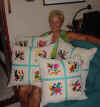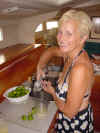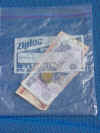|
Life
on the Hook in Zihua
The
sordid details of daily cruising life
 This
is how it really is while swinging on the ‘hook’ (anchor) in
Zihuatanejo Bay: a typical cruising experience. This
is how it really is while swinging on the ‘hook’ (anchor) in
Zihuatanejo Bay: a typical cruising experience.
The anchorages on the
west coast of Mexico are mostly open to the Pacific Ocean, much more so
than we’re used to in Pacific Northwest cruising. But the weather is
usually so mild in the winter that anchoring works, aside from the regular
waves coming straight in among the boats. Zihuatanejo has a beautiful
semicircular bay with four beaches and two main anchorages that are here.
There’s easily room for a hundred boats — maybe fifty are here now —
plus a cruise ship (we get about one a week). The
 latest
arrival is the motorboat owned by Larry Ellison (CEO of Oracle), and
cleverly disguised as a guided missile frigate. latest
arrival is the motorboat owned by Larry Ellison (CEO of Oracle), and
cleverly disguised as a guided missile frigate.
We decided to anchor
off Playa la Ropa, with its fine beach and clean water. That means we have
a longish dinghy ride into town for shopping or dinner, but we miss all
the boat traffic over there and especially the polluted water. Here, we
can swim, run our
 watermaker
every day, and have lunch at the beach palapas. It’s worth the price. watermaker
every day, and have lunch at the beach palapas. It’s worth the price.
We always use
‘Bruce’, as we call him, our 176 lb. monster main anchor, with lots of
high-tensile chain. Bruce has become very dear to us, as he has never
dragged, no matter how strong the winds. Zihua has Pacific rollers coming
in all the time, and the breezes change from onshore in the daytime to
offshore at night. So when we arrived, Jan went in the dinghy to put out a
smaller stern anchor that holds our bow into the waves at all times. We
also have a ‘roll-stopper’ suspended from the boom out at right angles
to the hull: a hinged, flat stainless steel plate that flexes with the
waves and resists rolling. Ah, comfort on the hook. Just a nice rocking of
the cradle to put you to sleep peacefully.
Almost no one wakes up
very early, and some are even chronically late for the 8:30 a.m. Cruiser
Net on VHF Channel 22. This takes place in all the popular cruiser
anchorages on the coast, always in the same format. One of the longtime
cruisers takes the Net Control job and goes through the same categories
every day: Check-ins of all the boats in the area (“Buenas Dias from
Raven”); Weather and Tides; Newcomers; Departures (lots of boats heading
for Costa Rica and the Panama Canal at this time of year); General
Announcements (potluck hors d’oeuvres and amateur music night at
Rick’s Bar); Local Assistance (‘Who can rebuild my diesel
injectors?’); Lost & Found; Treasures of the Bilge (Anything for
trade since we can’t ‘sell’ in Mexico) Everyone learns who’s here,
what’s happening, and where to get help.
Boat repair jobs and
projects are morning occupations on most boats, before the day heats up:
daily battery charging; water making; repairs of all kinds (The best
definition of cruising: “Fixing your boat in exotic places.”), or
maybe varnishing the teak (Not on Raven! We gave up our teak habit years
ago.). There is never a time on a boat when everything works. You always
have a list of
 jobs
to do, that you’re desperately trying to ignore. jobs
to do, that you’re desperately trying to ignore.
 Signe’s
big project in Zihua was to sew four cushions for the main cabin.
They’re based on sixteen highly colorful Mexican Indian embroideries of
fanciful animals. After a few trips around town to find the embroideries,
the manta (muslin) backing, and color-matched ribbon, she whipped
out the sewing machine and voila! Take a look at the photos. Pretty
cool, eh? Signe’s
big project in Zihua was to sew four cushions for the main cabin.
They’re based on sixteen highly colorful Mexican Indian embroideries of
fanciful animals. After a few trips around town to find the embroideries,
the manta (muslin) backing, and color-matched ribbon, she whipped
out the sewing machine and voila! Take a look at the photos. Pretty
cool, eh?
By about 10:30 AM it is
hot enough to stop work (What’s that?) and have a swim, that is if you
haven’t already had a wake-up swim. Then there’s the pre-lunch swim,
the after-siesta swim, the evening skinny dip, etc. The water is 78 to 83
degrees, so it is pretty pleasant any time.
When we dinghy to the
beach in town, we first put the landing gear down. Seriously. All the
inflatables are fitted with special wheels for landing on Mexican beaches
and rolling the dinghy above the tide
 line.
It can be pretty hairy on some beaches, many of which are steep, leaping
out before the next wave swamps you and remembering to cut the engine
quickly. Here in Zihua all is calm and easy. The water is kind of
polluted, though, so you always wash your hands and feet at the
fishermen’s faucet on the Malecon before walking in town. Then it’s
off to register with the Port Captain and with Immigration, required when
we first arrive in a major port, and when we leave. line.
It can be pretty hairy on some beaches, many of which are steep, leaping
out before the next wave swamps you and remembering to cut the engine
quickly. Here in Zihua all is calm and easy. The water is kind of
polluted, though, so you always wash your hands and feet at the
fishermen’s faucet on the Malecon before walking in town. Then it’s
off to register with the Port Captain and with Immigration, required when
we first arrive in a major port, and when we leave.
 We
have lots of choices in shopping: the small tiendas all over town,
the huge and wonderful ‘Comercial’ supermarket in the suburbs, or best
of all the big mercado, with everything from Mexican tupperware to
fresh-killed pigs. Signe always picks up lots of fresh fruit at the mercado,
especially big bags of limes. From the limes, she squeezes the Elixir of
the Gods, to use in making limonadas and the ever-popular margaritas.
No cruiser down here will ever suffer from scurvy. We
have lots of choices in shopping: the small tiendas all over town,
the huge and wonderful ‘Comercial’ supermarket in the suburbs, or best
of all the big mercado, with everything from Mexican tupperware to
fresh-killed pigs. Signe always picks up lots of fresh fruit at the mercado,
especially big bags of limes. From the limes, she squeezes the Elixir of
the Gods, to use in making limonadas and the ever-popular margaritas.
No cruiser down here will ever suffer from scurvy.
Of course this requires
water, which we could drink from our own tanks, but we’ve discovered a
better tasting alternative, “aqua purificada.” It comes in liter
bottles, which are a pain to buy enough of and then dispose of the plastic
empties. Instead, we buy a 19-liter bottle ($5 deposit on the jug, $1 for
the water) every once in awhile and bring it back to the boat on our
granny cart. Luckily we haven’t had to do this in the dinghy yet.
Getting it aboard would be quite a combination of muscular prowess and
balance as the ocean swell also affects getting from the dinghy onto the
stern of the boat. This comedy/adventure (depending on our mood) is not
for the physically unfit or the clumsy, both of which tend to strike when
we’ve got the most errands to do. Of course this same maneuver applies
every time we go to get provisions. We have a four-canvas-bag limit, one
for each hand, to all our shopping unless we have the granny cart, a car,
or a willing deliverer, all rare. So don’t worry about us neglecting our
weight lifting. We’ve got it covered!
Sometimes when we’re
really feeling decadent, or the chef has run out of tempting luncheon
dishes, we take the dinghy ashore at La Ropa beach to eat at one of the
many palapa restaurants. These consist of a combination of lounge chairs,
tables with tablecloths and chairs, beach chairs with tables, plus shade
trees and umbrellas. You can take your choice of accommodations. Cruisers
never sit in the sun like the turistas. We all try to stay out of
it as much as possible, knowing we get way too much in our daily
activities. Wide-brim hats and high-number sunscreen are de rigueur
for the cruising set. The palapa restaurant goers include plenty of
Mexican families with kids swimming, babies sleeping, papas snoozing, and
mamas watching out for everyone. Then there are the gringo retirees
playing cribbage, bridge or backgammon at tables under the trees. Then
there are the sun-worshiping turistas with lots of jiggly,
painfully-red exposed flesh. Our dinghy is usually a play attraction for
the local kids who climb in and out of it leaving a ton of sand at each
visit. This isn’t too bad since we usually manage to take on a second
ton along with a few major waves as we’re making our surf exit after
lunch. The dinghy looks pretty bad until we hit a port where there is lots
of water on the dock for cleaning everything up.
 Of
course, all these beach landings mean people and things often get soaked.
So we all wear quick-dry shorts and carry our stuff in waterproof kayak
bags. And gone are the lovely leather wallets and purses. When it comes
time to pay up at a restaurant, all the cruisers whip out their cruising
wallets: clear plastic Ziploc bags! And no one laughs: you do what you
gotta do. Of
course, all these beach landings mean people and things often get soaked.
So we all wear quick-dry shorts and carry our stuff in waterproof kayak
bags. And gone are the lovely leather wallets and purses. When it comes
time to pay up at a restaurant, all the cruisers whip out their cruising
wallets: clear plastic Ziploc bags! And no one laughs: you do what you
gotta do.
Here off Playa la Ropa,
the afternoon is often filled with the buzz of jetskis and parasailers. We
get worried sometimes, when the speedboat pulling the parachute cuts too
close the to sailboat masts. Two of the cruising boats have also been hit
by incompetent gringo jetskiers, which is far more dangerous to the
jetskiers than to the boats.
Most of us try out the
many restaurants, which are all cheap to varying degrees. ‘Casa Bahia,’
the best place in town with a gorgeous view of the bay, good food,
wonderful French guitar player (lots of ‘bons souvenirs’ from our
Paris days). Total for two, with four maragaritas, two bottles of water,
salads and main course: $60 including a 20% tip. Then there’s ‘Any’
where a couple of excellent tamales can set you back $2, plus a $1 for a
Corona with a lime.
The fleet is made up of
‘Left Turners’ — boats headed for Central America and the Panama
Canal —‘Right Turners’ — boats planning to sail across the
Pacific. Our tentative plan is to spend another winter here in Mexico, and
then perhaps head out across the Pacific in March 2002. But as the cruiser
maxim goes, ‘We have no plans and we’re sticking to them.’ On some
boats, people tend to follow that slogan to the letter, and succumb to
‘la vida dulce’ here in Margaritaville. It’s easy to get stuck in a
place like Zihua, and lots of boats have been cruising this coast for ten
years or more. We all say ‘It’ll never happen to me!’ but who knows?
Shall we go in town in
the evening or not? It all depends on whether we have good books going or
are in the mood for a movie. We usually make the trek only once a day.
We’re really ripping
through our vast book collection these days, maybe two or three books a
week for each of us. At this rate, we’ll be out of books in only three
years! Then there are the DVD movies we brought along. Raven Night at the
Movies might mean guests, or just the two of us watching ‘Notting
Hill’ or ‘Chinatown’ on one of the laptops.
 On
Wednesdays, there’s a big dinghy raft-up off La Ropa. We all come in our
dinghies, bringing our own drinks and an hors d’oeuvres to share, and
then we just tie up all the little boats together. It’s just a big
cruiser cocktail party on the water, as we watch the sun go down. On
Wednesdays, there’s a big dinghy raft-up off La Ropa. We all come in our
dinghies, bringing our own drinks and an hors d’oeuvres to share, and
then we just tie up all the little boats together. It’s just a big
cruiser cocktail party on the water, as we watch the sun go down.
There is always a good
sunset. Some are spectacular. There is not
 enough
film aboard to capture every one, and photos don’t really do them
justice. There is something wonderful about ending another great day in
such a beautiful way. The nights are calm with a brilliant canopy of
stars, and a vivid Milky Way. We often see shooting stars. enough
film aboard to capture every one, and photos don’t really do them
justice. There is something wonderful about ending another great day in
such a beautiful way. The nights are calm with a brilliant canopy of
stars, and a vivid Milky Way. We often see shooting stars.
But once in a while,
the Great Mexican Beach Fiesta, complete with the Great Mexican Speaker
System, hits the anchorage, and if you don’t have earplugs you don’t
sleep until they quit at 4 a.m. Luckily, we laid in a large supply.
So that’s what life
is like on the hook. We can suffer with it for another year, I suppose.
Cheers . . . Jan
Previous log
Next log |